3D2AG/P Rotuma. Antoine, 3D2AG will be active as 3D2AG/P from Rotuma Island, IOTA OC - 060, during October - November 2024.
He will operate on 160 - 6m, CW, SSB.
Recent DX Spots 3D2AG/P
3D2AG/P Log search QSL requests via PayPal.
His PayPal ads nyeurt@gmail.com
DXCC Country - Rotuma Island, 3D2/R.
3D2AG/P Rotuma Island News 18 November 2022
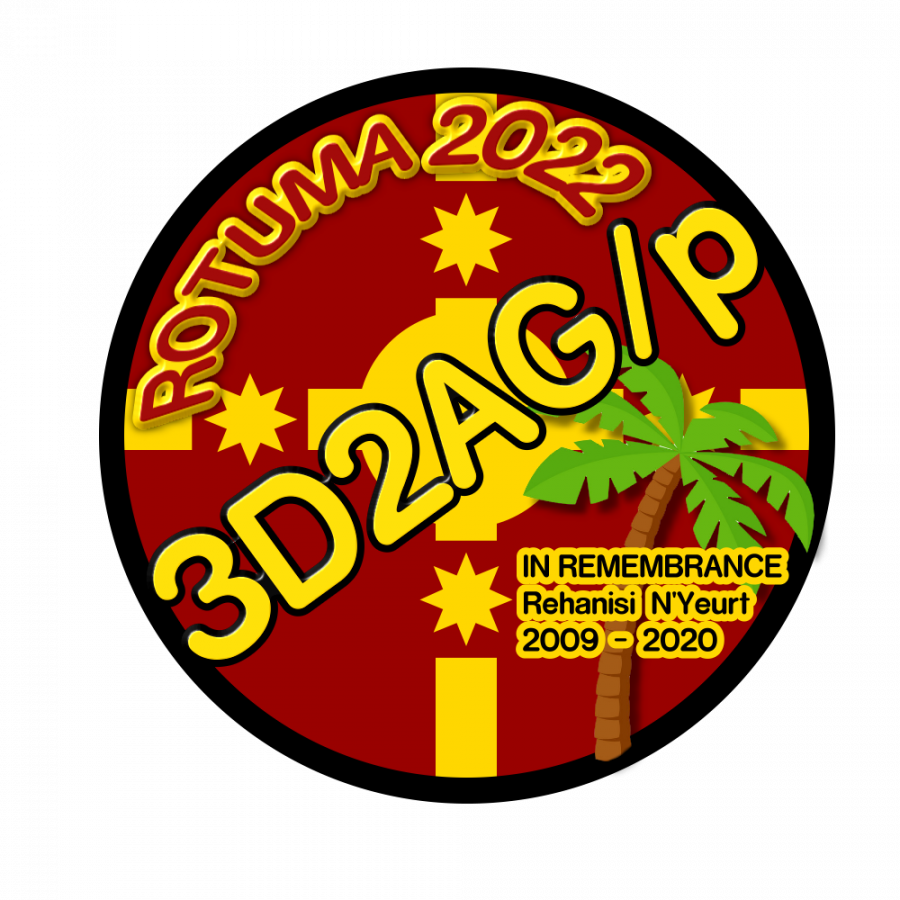
3D2AG Rotuma Island 2022. Logo.
Getting ready here to travel to Rotuma Island (OC-051) around 0600 UTC Saturday, for a 48-hour boat journey. Hoping to be operational around the 24th of November, and until the 26th or December. This is a one- man operation, combining QRL and DX. I hope to be QRV from 160m to 6m, although focus will be on higher bands (15m, 12m, 10m) on CW, SSB, RTTY and some FT8. It would take some significant time and effort to set up the 160m antenna, so I will first monitor the band to see if there is any activity.
Equipment will be the IC-7300 and IC-706MKIIG, with an ACOM 600S linear (max 650W). Most of my FT8 operation on higher bands will be using 100W and solar power; a 3KVA generator and QRO 600W will be used on lower bands FT8 and CW/SSB/RTTY on all bands including 6m.
Antennas will consist of the following:
160: 18m high inverted-L
80 / 40m: Home-made OCFD inverted V at 15m height.
30m / 60m: Monoband inverted Vs
20m-17m-15m-12m-10m: Spiderbeam
6m: 5-el Cushcraft A50-5S Yagi (extended boom version).
On CW I will usually be on the lower portion of the band, unless when the band is open to the USA I will try to be on the general class portion, unless the QRM is too high.
Tentative CW/SSB QRGs:
160m: 1822.5 KHz
80m: 3502 KHz / 3792 KHz
60m: 5359 KHz
40m: 7002 KHz / 7152 KHz
30m: 10107 KHz
20m: 14002 KHz / 14030 KHz / 14260 KHz
17m: 18072 KHz / 18152 KHz
15m: 21002 KHz / 21030 KHz / 21260 KHz
12m: 24902 KHz / 24952 KHz
10m: 28002 KHz / 28030 KHz / 28352 KHz
6m: 50.102 KHz / 50115 KHz
FT8 Operation will be using MSHV 2.68 Multistream; fully compatible with both F/H and normal FT8 mode. If possible, to save time please call with a report and not grid. On 160m I will mostly use JTDX on normal mode as signals are usually very weak.
Usually I will start on a normal FT8 QRG, and once a pileup builds up, will QSY to the nominated out-of-band QRGs:
160m: 1836 KHz
80m: 3576 KHz
60m: 5357 KHz
40m: 7056 KHz
30m: 10131 KHz
20m: 14080 KHz
17m: 18095 KHz
15m: 21080 KHz
12m: 24911 KHz
10m: 28080 KHz
6m: 50.323 KHz
Please note that there will be NO internet in Rotuma and I will not be able to entertain sked requests, read any emails, cluster posts or social media apps and there will be no real-time online log. Logs will be uploaded to Club Log after my return to Fiji. Pending QSLs (there are still lots of them, apologies) will also be dealt with on my return.
During this trip my first task will be to lay some flowers on the grave of my dear son Rehanisi, who left us so unexpectedly and cruelly on the 9th of January 2020. Thank you to all who have sent condolences, messages of support and helping words; each of these is most sincerely appreciated.
This upcoming operation will be partly supported by the German DX Foundation and the Clipperton DX Club, and they are both sincerely thanked for their sponsorship.
Looking forward to work you on the bands and VY 73,
Antoine 3D2AG
3D2AG/P Rotuma News 20 December 2020
3D2AG/P QRV now.
3D2AG/P Rotuma Island News 26 December 2019
Greetings from Rotuma Island. The linear is behaving, and generator power available when not heavy rain, otherwise running FT8 on solar power. The 160m antenna is still not up due to king tides and impossibility to setup on the beach at the moment. It almost got washed away (including myself) yesterday with very strong waves. Right now we have a cyclone warning, strong winds and heavy rain. All antennas are lowered until further notice. EMCOM has been activated through PACTOR. More updates later if antennas are still up. VY 73s Antoine 3D2AG
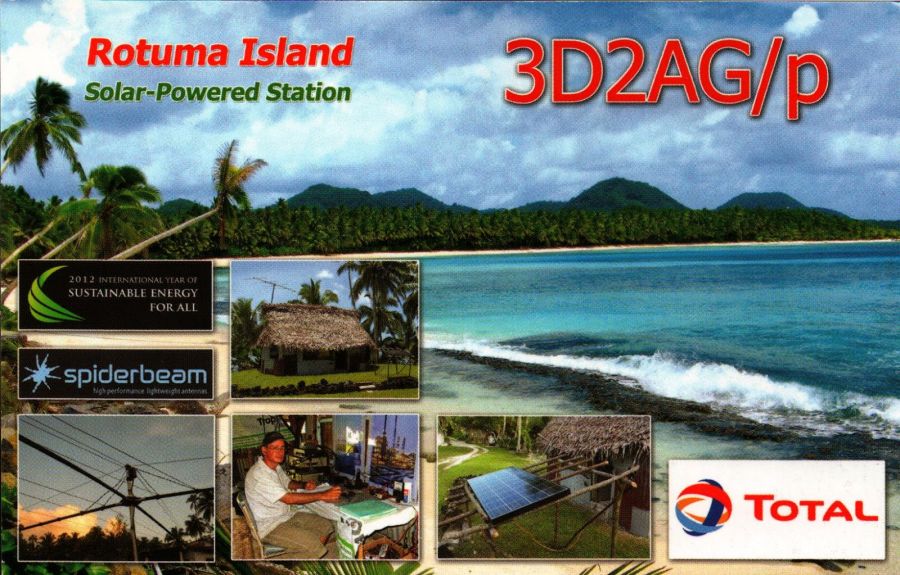
Rotuma Island. Information
Rotuma Island and nearby islands are located 646km north of Suva, Fiji.
Official languages- Rotuman, English.
Independence from the United Kingdom with Fiji 10 October 1970.
Currency- Fiji dollar FJD.
Time- UTC +12.
International phone code- +679.
Rotuma volcanic island 43sq km .
Tourist attractions- Grave of the kings.
There are no hotels on Rotuma Island.
3D2AG/P Rotuma Island. Amateur Radio information
DXCC country- Rotuma.
WAC continent- Oceania.
WAZ zone- 32.
ITU zone- 56.
QTH locator- RH87.
RSGB IOTA reference- IOTA OC-060 Rotuma Island.
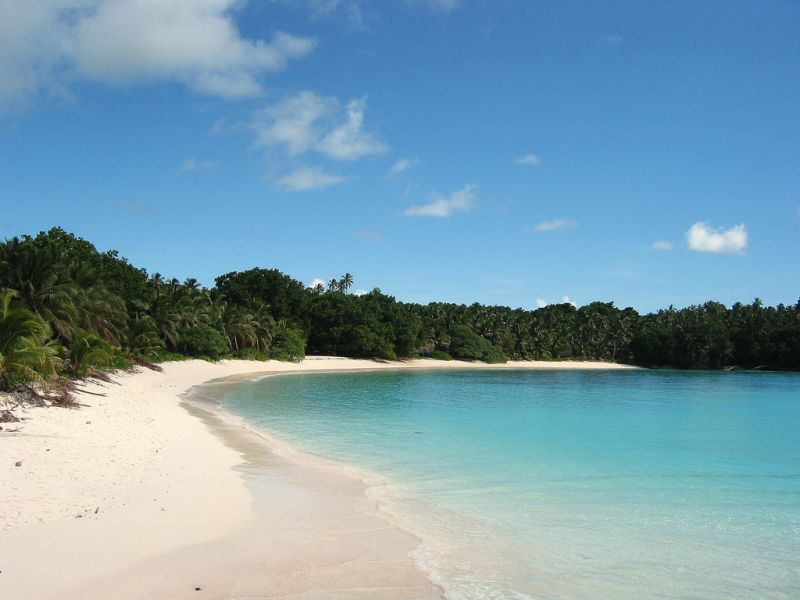
Rotuma Island
Introduction
Rotuma Island is the main island that makes up the Fijian dependency of Rotuma, and is the home to a small tribal group of people. These people are called the Rotumans, which, in all, total only ten thousand people.
Geography
This islandis the 12th largest that constitutes Fiji. North of Fiji, Rotuma Island is than 70 total square miles, and is particular in the way it is divided. Those who know the island refer to its eastern landmass, and its large peninsula in the west, which begins at a very narrow point of less than 75 feet across. North of this part of the island is the Maka Bay, and the Hapmafau Bay, which lays in the south. These bays are famous for their particularly beautiful coral reefs, which many people visit on a yearly basis.
On the site exists something known as a shield volcano, which is, in this unique case, made of something known as alkali-olivine basalt, as well as hawaiite, and reaches nearly one thousand feet above sea level. At the center of Rotuma Island, there is a mountain that is called Mount Suelhof. It is not the only mountain. At the eastern edge of Rotuma Island, there is Satarua Peak. As a whole, many people aware of the island regard it, with its beautiful untouched beaches, to be one of the most beautiful places in the world.
The other islands accompanying Rotuma island include Hafhai, Hatana, Husia, ‘Afgaha, Solkope, Solnoho, Uea, Hafhaveiaglolo, Hafliua, Haua, and Hauamea’me’a.
Language
Although Fiji dependency is of modern circumstance, Rotuman language provides evidence of a growing relationship between the two places long before that. As a result, people who study languages have included the Rotuman language as a subgroup of the language of the people of Fiji. They also have connections to Samoa, dating back to the time when they were lead by Raho. After this point in time, more people settled in on the island from Tonga, and then after this: Kiribati. In the 19th century, people of Tonga tried to further assess the land.
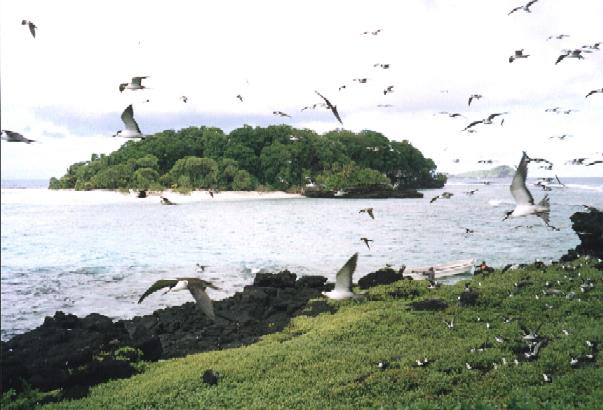
History
In 1791, Captain Edward Edwards and his crew on the HMS Pandora discovered Rotuma Island. They have been noted to be the first European sighting of the place. They landed on the island for an interesting reason; they were looking for sailors who had disappeared. About sixty years later, RotumaIsland became a common sailing point for western mariners when they needed to repair their ships and look for food. Sometimes, lone sailors would settle in the island, sailors which were actually prisoners and convicts who escaped the grasp of their jailors and confinement. These cases were reported to have ended violently.
When settlers from Tonga began to settle themselves on the land around the same time, so did Catholics. This caused a lot of struggle between the two groups, often turning into political disarray and physical conflicts. The grim events resulted in the Tongans to ask Britain if the settlers could be annexed from the Island. Instead, the island became ceded to the UK, at which time Fiji became a British colony. Although there had been conflict, this day is celebrated today as Rotuma Day.
Today, although technically part of Fiji, the culture found on Rotuma Island is, in actuality, much closer related to Polynesia. They are so different, in fact, that the people in Fiji differentiate them as being a minority, and even highly recognized. In modern times, however, Rotumans as a majority have moved to Fiji. The ones remaining in Rotuma, though, preserve their ways and culture.
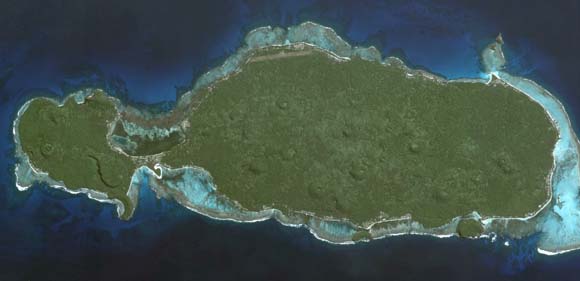
Travel
Now, the differences between Rotumans living in Fiji and those on Rotuma Island are so great, that officials have deemed it quite necessary for tourism to take place on the island, to enlighten onlookers of the special culture. For over 30 years now, cruises and ships have settled on the island: tourists, who enjoy the marvelous beauty and wonders of the land and people. Travel agencies and websites alike have this location as a vacation hotspot, and are always interested in helping travelers find the best deals.
Politics
As mentioned above, Fiji, and thus, Rotuma, was taken by Great Britain as a colony in the late 19th century. Although Rotuma is not a large land by any means, it is separated into a large number of districts, which are all lead by their own chief. These districts include: Noa’tau, Oinafa, Itu’ti’u, Malha’a, Pepiei, and Itu’muta. There are many villages within each district.
The chiefs of these different districts together make the Rotuma Island Council, which work together. These are all men who are mostly titled, and are expected by their people to be leaders. These titles are unlike many western cultures in that titles are held for life instead of an appointed time. Those related to these leaders may also rise to be leaders if they so wish. The Rotumans also hold formal occasions where all of those of importance, as well as highly esteemed outsiders, gather and are honored. A feast is presented to these highly regarded individuals with baskets, as well as something known as kava. Throughout the year, however, they resort to living humble lives. Most people live humbly, and not many luxuries are owned. Cars and extravagant living situations, for example, are hardly found in the wealthiest of people.
Another level of politics on Rotumais with the political positions of sau, mua, and fakpure. The sau are known to lead the ritual cycle, which focuses on prosperity. The mua is not as strongly defined, but also takes part in the ritual cycle. Some regard them as high priests. The fakpure are the most defined, working as conveners and officers over the other leading men, and are responsible for appointing the positions of the other two groups.
Conclusion:
Rotuma is one of the most beautiful places in the world, with pristine beaches and colorful coral reefs that inspire awe. Its history and relationship with Fiji and Polynesia make it truly unique.
Video Rotuma Island

